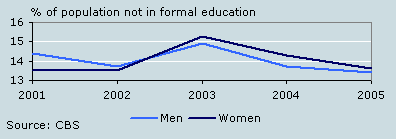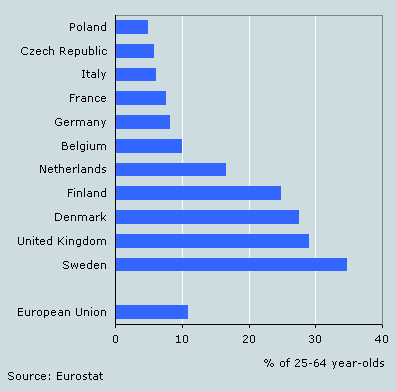Stagnating participation in adult education

Fewer people who are no longer in regular secondary or higher education are undertaking some form of training. In 2005, 13.5 percent of this group participated in a course or some form of training. In 2003 this was still 15 percent. Compared with other countries in Europe, the Netherlands ranks behind the leaders.
Rising participation up to 2003
Participation in adult education rose from nearly 12 percent in 1995 to 15 percent in 2003. After that it fell to 13.5 percent in 2005. Five years ago fewer women than men attended adult education. They have caught up since then though.
Participation in adult education

Lowest participation among lower educated and older people
Participation in adult education is low among people with lower education levels. The higher the educational level, the more likely someone is to participate in some form of adult education. There is also a correlation with age: fewer older people participate in adult education.
Participation in adult education by age and level of education, 2005

Training mostly work-related
Most people do a course or undertake some kind of training because of their job, or to help them get another job. This is true for more than four out five people in adult education. Employees in the government and semi-government sectors and in financial and business services are relatively more likely to participate in adult education.
The Netherlands just behind the leaders in Europe
For Europe as a whole the indicator related to adult education is so-called lifelong learning. This is defined as the percentage of 25–64 year-olds undertaking some form of training. The Netherlands ranks below leaders Sweden, the United Kingdom, Denmark, Finland and Switzerland.
The Lisbon norm prescribes that 12.5 percent of the population should undergo some form of training in 2010. The Netherlands therefore already complies with this norm. However, the Dutch government has set itself a higher target, and aims for 20 percent participation in year 2010. As participation in lifelong learning fell from 17.4 percent in 2003 to 16.6 percent in 2005, it will have to start increasing again if the target is to be realised.
Participation in lifelong learning in some countries, second quarter 2005

Max van Herpen